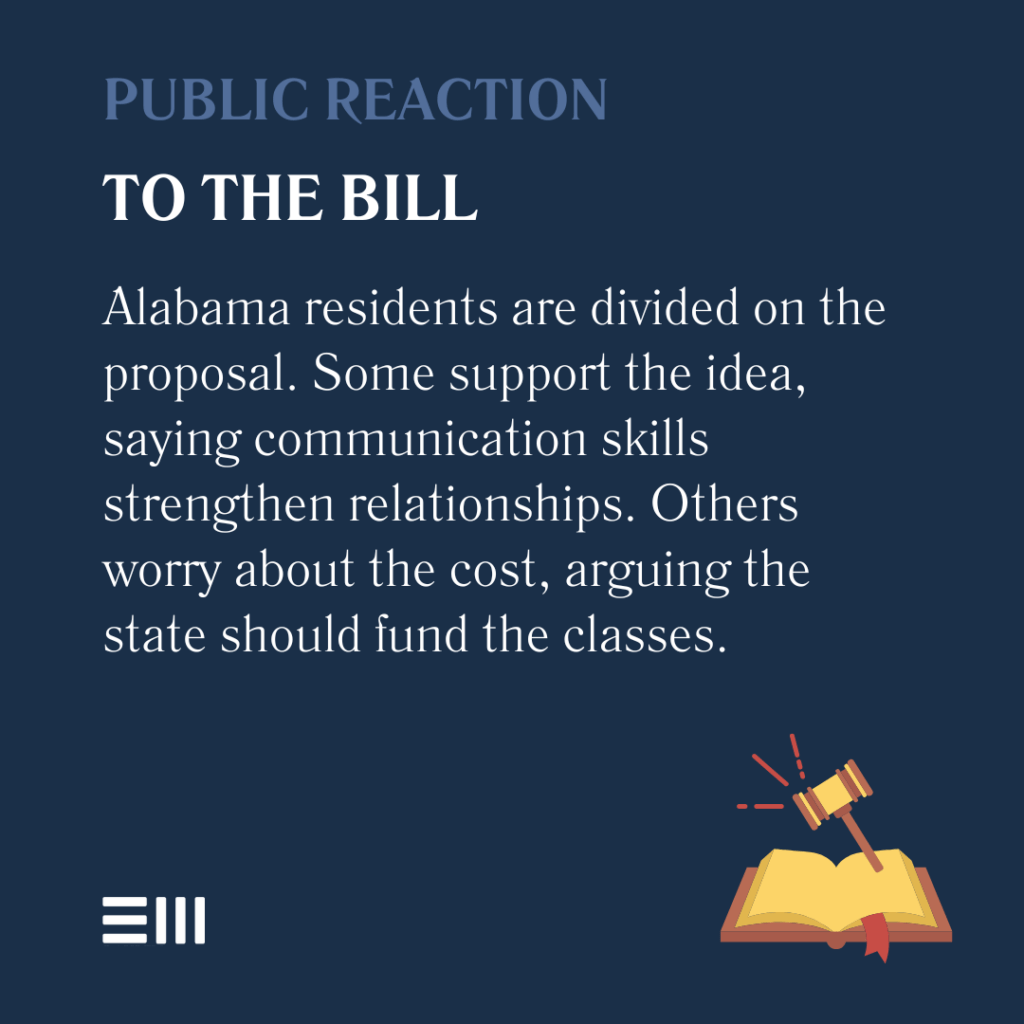
A new bill pre-filed by Alabama State Senator Rodger Smitherman of Birmingham could add an additional requirement for couples planning to tie the knot in Alabama. The proposed legislation would mandate that couples attend a conflict resolution class before obtaining a marriage license, with the stated goal of reducing domestic violence across the state.
Currently, Alabama residents need only complete and obtain a notarized Certificate of Marriage and pay a recording fee to get married. Senator Smitherman’s bill would add the conflict resolution class as a third requirement.
“If we have conflict, we are going to solve that in a very humane, nonviolent, nonabusive manner and that’s what we’re trying to establish with this bill,” Senator Smitherman said when discussing the proposal.
Focus on Preventing Domestic Violence
The senator has made it clear that his primary motivation is reducing instances of domestic abuse in Alabama marriages. By equipping couples with conflict resolution skills before they enter into marriage, he hopes to address problems before they escalate to violence.
“If you have someone who has been exposed to how to resolve resolutions other than resorting to a weapon, assault, whether it be verbal or abusive…if you say you want this, then this bill is worth it,” Smitherman stated.
Family law attorneys recognize that domestic violence often leads to divorce and complex custody battles that can be traumatic for all involved. Early intervention through education could potentially reduce such cases.

Cost Concerns
One issue that has raised eyebrows is the question of who would pay for these classes. According to current information about the bill, couples would be responsible for covering the cost themselves, though Senator Smitherman has expressed his intention to keep these classes affordable.
This additional expense has prompted concerns among some Alabama residents.
One local interviewed about the proposal stated, “I can’t afford groceries right now so I mean yeah, they should pay for it through the state. I think that they should take the class but I think that if they’re gonna make it happen as a law, they should pay for it as a fund of the state.”
Mixed Public Reaction
Public opinion on the proposed legislation appears divided. Residents have expressed various perspectives on the bill:
- Opposition to mandatory classes: “I don’t know that it should be mandated to take conflict resolution,” said local resident Irvin Allen.
- Support for communication skills: Cory Donehue sees merit in the proposal, stating, “Conflict resolution, some people are better at it than others. You know, some people might walk away from conflict and I think the best solution is to sit down and talk and you know, hear one another and listen to one another and learn from each other. And I think that’s very beneficial to have a true, good relationship and then go into a marriage with that.”
- Preference for prevention: Another local resident pointed to the possible preventative benefits: “Better to be aware of things, to be aware of each other and be prepared for whatever problems come up so you can deal with them, rather than to go to divorce.”
- Concerns about costs: One local commented, “I can’t afford groceries right now so I mean yeah, they should pay for it through the state. I think that they should take the class but I think that if they’re gonna make it happen as a law, they should pay for it as a fund of the state.”
As the bill moves forward in the legislative process, these diverse perspectives highlight the complex considerations at play for both lawmakers and Alabama families.

A First in the Nation
According to the Institute for Family Studies, approximately ten states in the U.S. have implemented some form of premarital education policies.
However, if Senator Smitherman’s bill passes, Alabama would become the first state to specifically focus on conflict resolution skills in its premarital requirements.
Implications for Alabama Couples and Family Law
For family law practitioners, this bill represents an interesting development. While divorce attorneys regularly deal with the fallout of relationship conflicts that have escalated beyond resolution, this preventative approach could potentially reduce domestic violence cases and, by extension, divorce filings related to abuse.
Family law attorneys at firms like Baxley Maniscalco regularly assist clients with the legal aspects of marriage and divorce. This legislation would add a new dimension to the marriage process in Alabama that could have long-term implications for family dynamics.
The bill is currently in its early stages, and it remains to be seen whether it will gain the necessary support to become law. If passed, it would represent a significant shift in Alabama’s approach to marriage requirements and potentially create a model for other states interested in preventative measures against domestic violence.
For Alabama couples planning to marry in the near future, it would be wise to keep an eye on this legislation’s progress, as it could add an additional step to the marriage process should it pass.
If you have questions about family law matters or are facing challenges in your marriage that require legal assistance, the team at Baxley Maniscalco is available to help navigate these complex issues.
Get Expert Family Law Advice in Alabama
If you’re considering marriage, divorce, or have other family law concerns in Alabama, having experienced legal counsel can make a significant difference in the outcome of your case. At Baxley Maniscalco, our attorneys have decades of combined experience representing clients in complex family matters across the state.
We understand that family law issues are often emotionally challenging, and we’re committed to providing compassionate, dedicated representation to help you achieve the best possible results. Our team is available to answer your questions and guide you through the legal process every step of the way.
Don’t navigate complex family law matters alone.
Schedule a consultation with our experienced team to discuss your specific situation and legal options.
Can't find what you're looking for? Search our site below.










